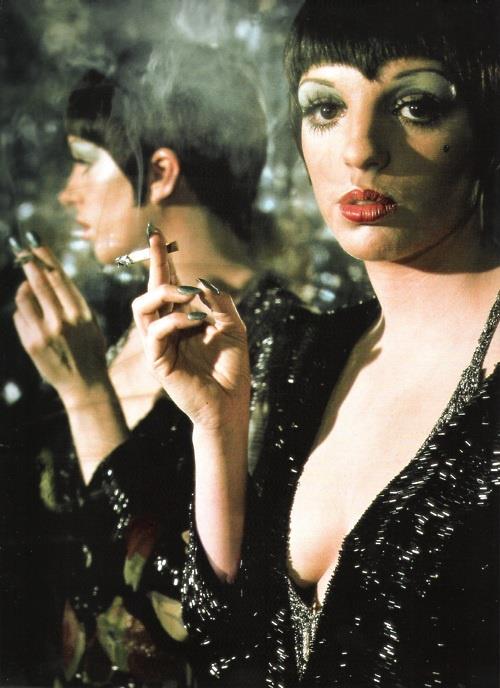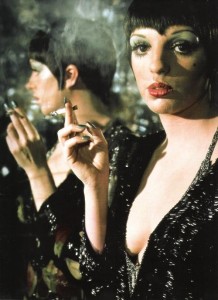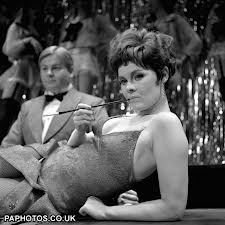Kristin Chenoweth, On the Twentieth Century – Very rarely have I seen a marriage of performer and character more perfect than Chenoweth and Lily Garland. Ferociously funny, surprising, and using her multi-octave voice to breathtaking comic effect, she dominated from her entrance as a dowdy rehearsal pianist to her manic, idiosyncratic delivery of “How dare you?” in the last scene, which I found so hilarious, I almost had an asthma attack. A dazzling comic star turn.
Judi Dench, The Winter’s Tale – Shakespeare’s bizarre little play was given a beautiful production as part of Kenneth Branagh’s year-long season at the Garrick. As Paulina, King Leontes’ trusted advisor, Dench swept onto the stage and delivered Shakespeare’s dialogue as if it were as natural as breathing air. Her command and breathtaking control, particularly in scenes where her character is constantly on the verge of getting herself into serious trouble, gave me full-body chills. There’s a certain element of audience affection for a legend involved here, but a performance couldn’t stand on that alone. Dench has prove herself, once again, as one of the foremost Shakespearean interpreters of our time.
Ellen Greene, Little Shop of Horrors – This summer’s Encores! presentation was more a revival in the religious sense than theatrical, with the faithful coming to worship at the altar of Ellen Greene. It’d been 33 years since Little Shop first opened off-Broadway, but Greene entered in that form-fitting dress, blonde wig and the years faded away. A triumph of humor and pathos, Greene resurrected the non-specific accent, dead-pan wit and heart as big as all out doors. The audience screamed its approval when she entered, and by the time she and her formidable co-star Jake Gyllenhaal finished “Suddenly Seymour,” the entire audience at City Center leapt to its feet for a thunderous standing ovation. During the character’s final scene, I’ve so rarely seen a performer make an audience vacillate between tears and laughter every other line. I rarely consider use the word “definitive,” but Ellen Greene’s Audrey is so perfect and iconic there is just no other term for it.
Matt Henry, Kinky Boots – I hadn’t seen Kinky Boots before its London production (because accents) and I am grateful to have seen Henry’s triumph as Lola (a role which won Billy Porter a Tony). Killian Donnelly slays as Charlie, the proprietor of the boots shop, but the evening belongs to Henry, who is fierce, funny, and moving. Mr. Henry’s flashy, flawless star turn is probably as close as we’ll ever get to Grace Jones in a stage musical.
Ruthie Ann Miles, The King and I – Providing formidable support in the court of Siam as Lady Thiang, some of Miles’ greatest moments were her arresting silences. She observed, listened, and absorbed in all her surroundings as the concerned mother of a Crown Prince, but also as the wisest person in the room. Watching her rejoice when her son accepts Mrs. Anna, or seeing her instant grief during the finale, hers was a performance of astonishing complexity. “Western People Funny,” a number that has proven problematic in recent years became, in her hands, a droll indictment of Western imperialism.
Kelli O’Hara, The King and I – A performance of such grace and strength, I found myself weeping with joy the moment she started to sing “Hello, Young Lovers,” and again many more times (most surprisingly “Getting to Know You”). She offers a first-rate rendering of the classic Rodgers and Hammerstein score, and brings a staunch feminist sensibility to Mrs. Anna (some of which is due to Mr. Hammerstein, but Ms. O’Hara’s Anna isn’t taking guff from any man). Funny, heartwarming and often quite tender; it’s a performance I want to relive again and again.
Benjamin Scheuer, The Lion – Scheuer wrote and performed this solo bio-musical, which takes us through the highs and lows of his life (thus far). He touches on a complicated relationship with his father, a battle with cancer, but Scheuer’s memoir is inspiring and moving, never maudlin. He’s more of a singer-songwriter (and virtuosic guitarist) than actor, but his enthusiasm and connection with the audience was authentic, sincere and ultimately profound.
Chita Rivera, The Visit – Ms. Rivera headlined this dark, unrelenting weird musical adaptation of the Duerrenmatt play about a revenge-seeking widow. I wasn’t sure how I felt about the show after the first preview, but it kept me up most of the night thinking about. I ended up seeing the show three times (I liked it!), including the closing where Ms. Rivera, one of the legendary pros, went on with laryngitis. She modified what was a mesmerizing performance in the spur of the moment into something transcendent. I knew by the time she got to the end of the first line of her first song that we were in for something truly special. 85% of her singing was sprechstimme, making the moments she could actually sing all the more impactful. The lack of voice only seemed to enhance her performance; everything was more visceral, more haunting and more devastating. Her eleven o’clock number received a 75-second standing ovation. A master class like none other.
Imelda Staunton, Gypsy – This performance so rocked my solar plexus that I flew over to see the show twice more during its final week. Staunton’s Rose is a harrowing, yet irresistible creation with one foot in classical theatre and the other in musical comedy. I have never been so moved by this most classic of musicals. I didn’t think it was possible at this point to surprise me, but within 60 seconds of her entrance, I had gasped aloud in shock. Staunton’s arc is so complex and fully-realized that it made her performance at the Savoy so unsettling real and perhaps identifiable. Her “Rose’s Turn” was less a mad scene than a journey of harsh self-discovery, and her immediate breakdown afterwards was a like an exorcism. What also astonished me was how her focus sharpened over the course of the run (I’ve seen other Roses who have gone off the rails by the end of their contracts) and made certain moments smaller, more disciplined, and ultimately more impactful and terrifying. The end result was the greatest performance I’ve ever seen in a musical.
Lydia Wilson, King Charles III – Mike Bartlett ingeniously repurposes the history play as futuristic speculation, taking a look at what might happen when Queen Elizabeth II dies and Prince Charles ascends the throne. Anchored with a Lear-like portrait of Charles by the sensational Tim Pigott-Smith, the play offers the blank verse, asides and even the ghost you might find in Shakespeare. What struck me most was Lydia Wilson’s portrayal of sunny Kate Middleton as a privately Machiavellian wife; a performance of such surprise cunning that she would make Lady Macbeth flee in terror. Her feminist soliloquy explaining her actions is one of the high points of this contemporary masterpiece.
The best ensemble I saw (out of so many great ones this year) was the cast of the Tooting Arts Club production of Sweeney Todd, which I saw during its return West End engagement. With the show was pared down to its barest elements, a cast of 8 and an audience of 69 experienced a most intimate, harrowing production of the Sondheim-Wheeler classic in the most apt location: a meat pie shop. We were seated at long tables on uncomfortable benches; there was even an option to eat pre-show pie and mash. Some audience members were pomaded, while others were lucky enough to have their throats briefly kissed by Sweeney’s razor. This conspiratorial atmosphere was so perfect that the audience didn’t applaud until the end of each act; it would have destroyed the magic. Jeremy Secomb, Siobhan McCarthy, Duncan Smith, Ian Mowat, Kiara Jay, Nadim Naaman, Joseph Taylor, and Zoë Doano were exceptional. (PS: you haven’t lived until Sweeney Todd has wielded a cleaver a foot from your head).



